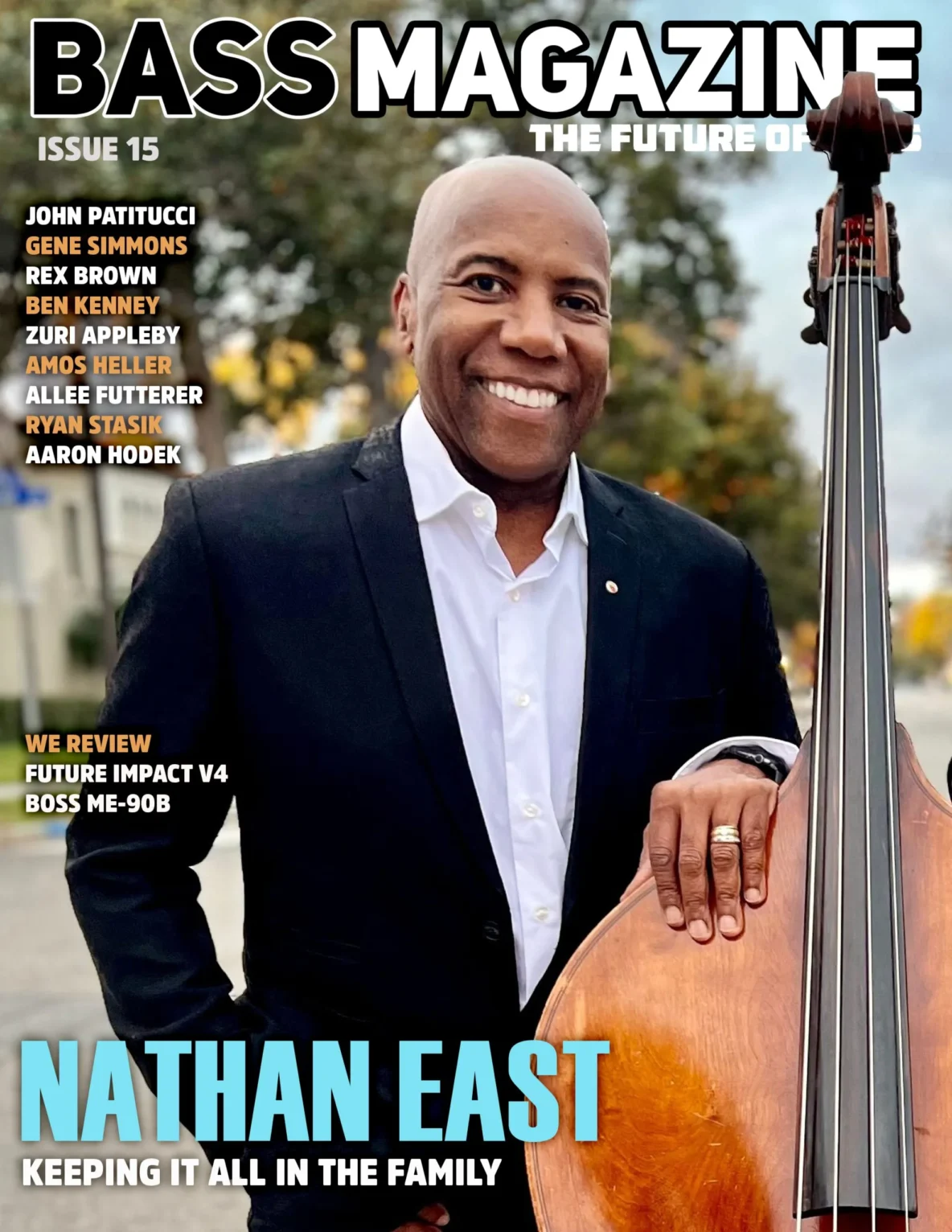Zuri Appleby: Sergeant of Low End
From Doechii to Lizzo to Janelle Monàe to Nick Jonas, the ex-Marine is making big waves
by Jon D’Auria / May 27, 2025 (Bass Magazine: Issue 15)
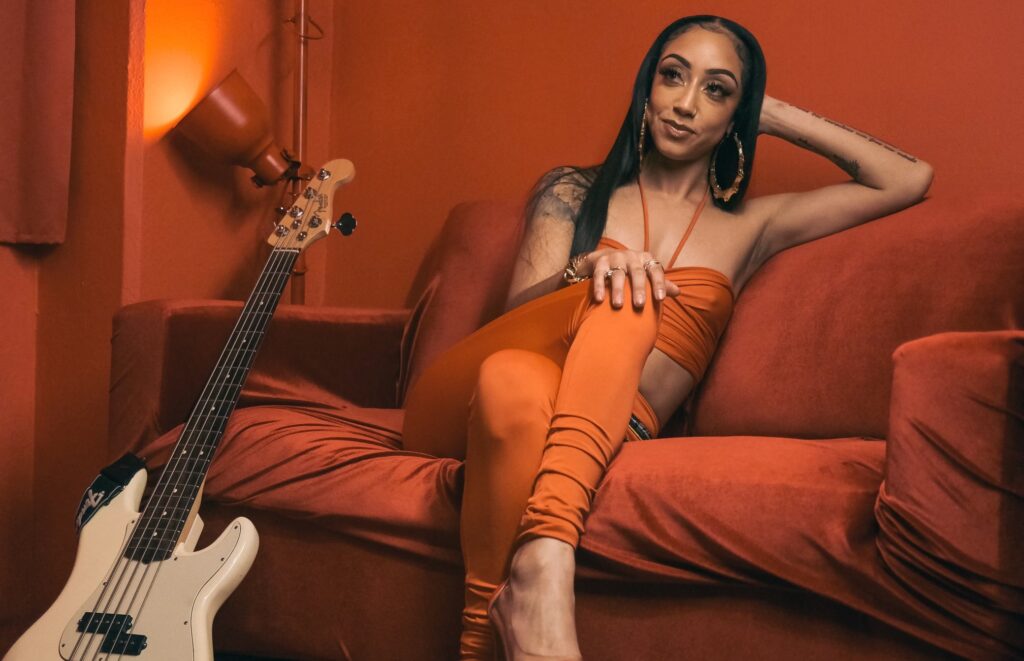
Zuri Appleby is no stranger to the spotlight. A lifelong musician born to a musical family, she got her big break in 2015 touring with Nick Jonas before going on to perform with Cynthia Erivo, Willow, Adam Lambert, Janelle Monàe, and a slew of others before becoming Lizzo’s bassist, which places her on stages all over the globe. But a recent appearance on NPR’s Tiny Desk Concert Series performing with rap phenom Doechii gave the world an up-close look at her command as a performer. Already amassing over 15 million views, the video finds Appleby front-and-center-frame rocking her F Bass 5-string and holding it down with an all-star band. Her visibility immediately skyrocketed, as did her respect and adoration from fellow bass players and musicians.
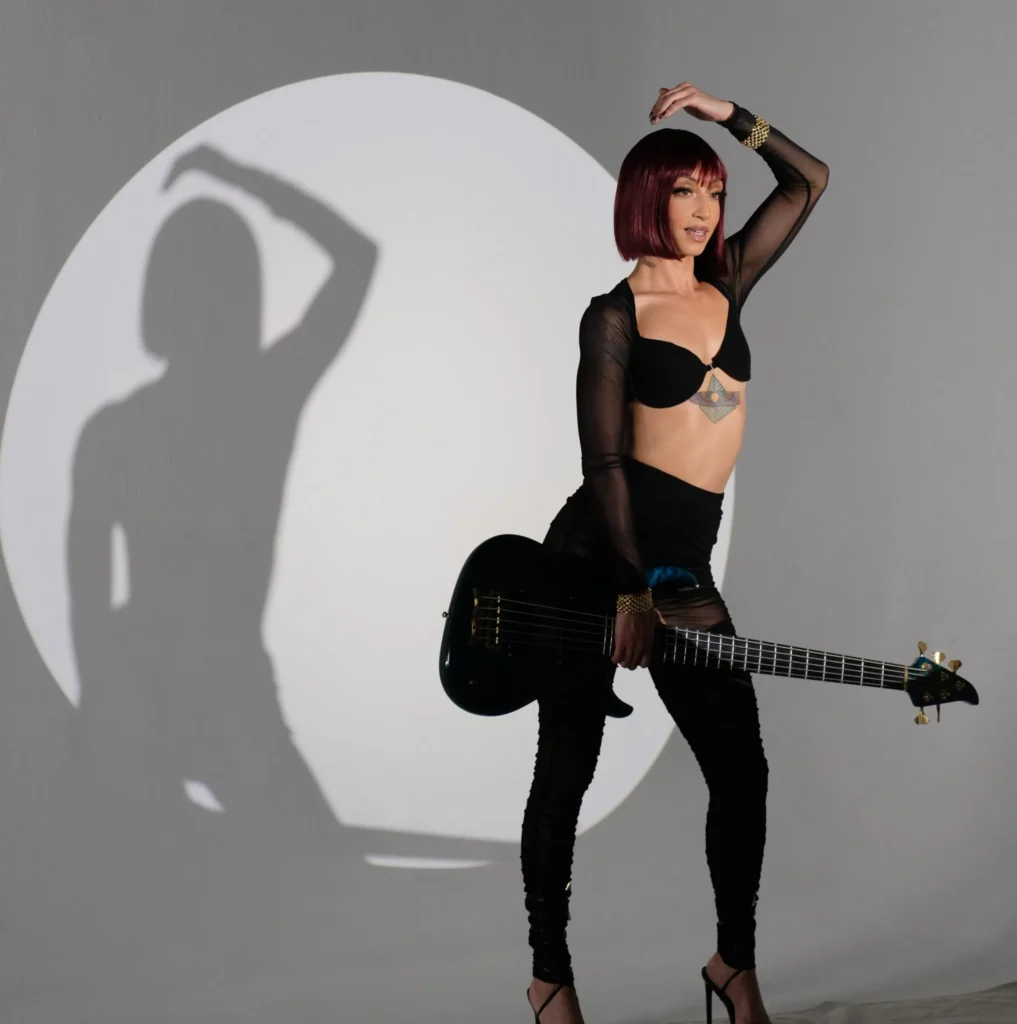
While that served as the first glance of Appleby’s talent for many people, the transplant from Buffalo, New York to Los Angeles has been working hard at her craft her whole life. She started off as a talented singer and multi-instrumentalist from age five and fell in love with the bass at age 11. At 16 she began gigging around Western New York. After graduating from the Buffalo Academy for Visual and Performing Arts, she was recruited to join the U.S. Marine Corps Band, which served as a musical boot camp (and actual boot camp) that honed her work ethic and sharpened her talent as a musician. After achieving the rank of Sergeant, she continued her studies at Buffalo State College, finding demand for her bass playing immediately afterward.
When she’s not on tour, which is increasingly rare nowadays, Appleby takes her woodshedding and practice seriously, having been raised by a bass playing father and vocal-coach mother, combined with the strong discipline she picked up in the military. Her drive, humility, and gratitude are her biggest assets, along with her deeply soulful work on the fretboard, which has made her a first-call player for the biggest artists in the game. And while she doesn’t prefer to be in the spotlight herself, she’s certainly accustomed to it by now.
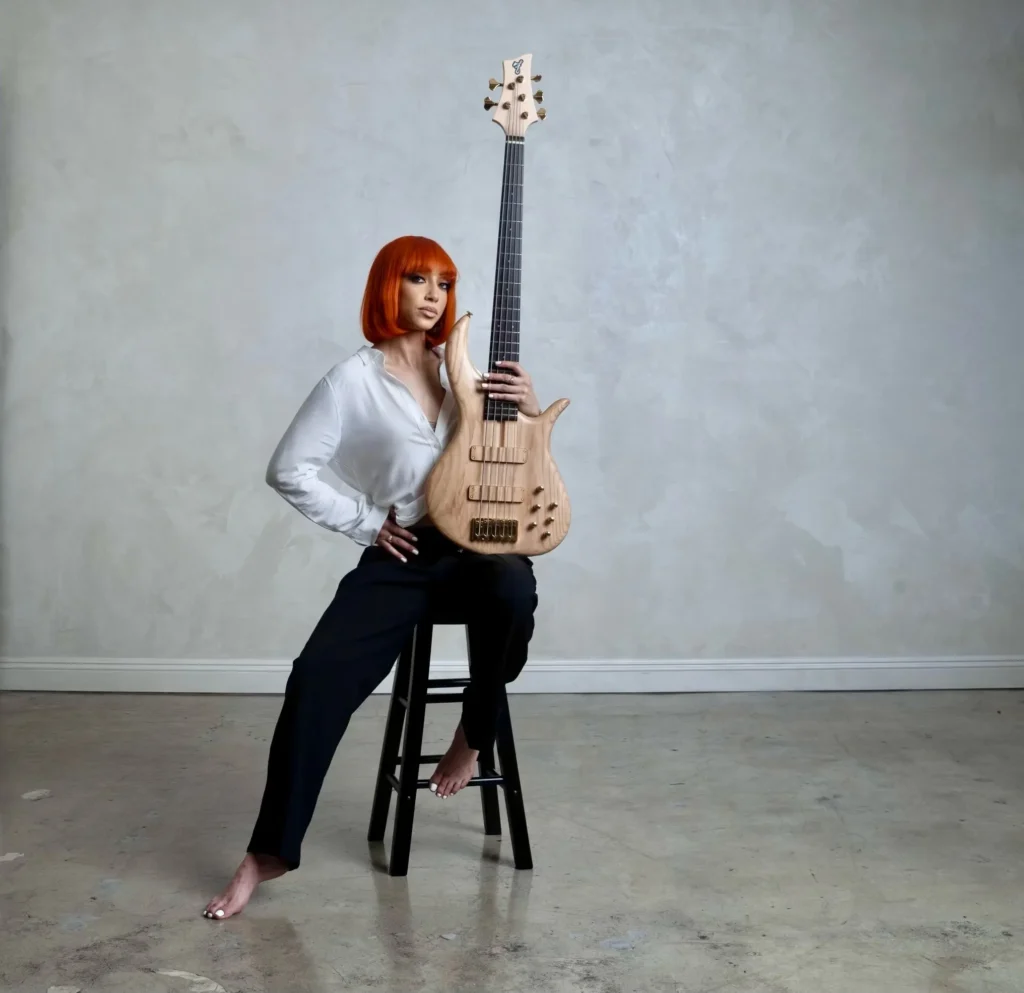
Doechii’s viral Tiny Desk appearance put you on the radar of a lot of people. What was that experience like for you?
It was a very quick turnaround from being asked to do it to it being recorded. That in and of itself was exhilarating, challenging, crazy, and an amazing ride. Being able to witness her and her prowess was freaking insane. Seeing how she presents her music was amazing, and working with all of those amazing ladies was unbelievable. Since then, it’s been an overwhelming amount of love, and I’m so appreciative for everyone who found me through that project. I was smack dab in the middle, so you couldn’t miss me. A lot of times bass players are in the background, which I have no problem with because it gives me a little security blanket to just focus and get into the music. But being in positions like that definitely challenges me to feel comfortable in a multitude of settings and learn how to handle discomfort in a more graceful way. I’m just so grateful for all of the genuine love that came from that performance.
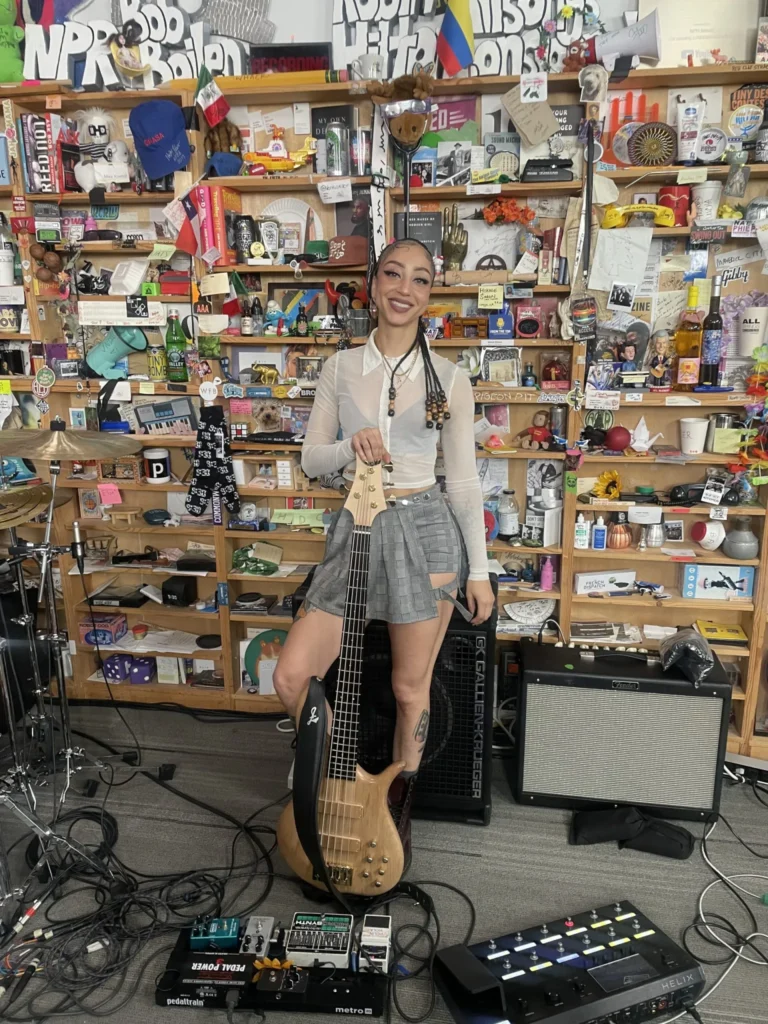
The notes end up being the last thing you have to worry about if you’re paying attention to the moment and you know what it’s calling for. The notes are pre-scripted. Everything else is in the moment.
There’s a lot going on inside that music, with lots of nuances and intricacies. What is it like playing with Doechii?
All those transitions and quick hits and stops in that music isn’t the hard part, it’s getting everybody on the same brainwave to do it at the same time. Everybody hears it a little differently and anticipates things in different ways. It’s been an ongoing journey of understanding everybody’s role in the music and where everything sits. The longer you become a seasoned musician, the more you understand what matters in the music and in your playing. Now I ask myself why I’m adding a run into a part or what the purpose is of me playing what I’m playing. And the Tiny Desk performance was so intimate, so I focused on giving room to the moment and understanding my role. When it’s my time to drive the bus, I’m going to drive the bus. But you need to have the awareness of what’s going on around you so you can adjust on the fly. It’s so much about reacting. It’s such a brain journey, and I’m such a heady player now. The notes end up being the last thing you have to worry about if you’re paying attention to the moment and you know what it’s calling for. The notes are pre-scripted. Everything else is in the moment.
Tell us about your musical upbringing and musical family.
I’m sure I was aware of music in the womb, because it was always around me. My mother is a piano player and music teacher who has been teaching for 50 years now. Being born to somebody who is so involved put me in such a big musical circle from the start. My dad is a bass player, so shout out to the bass club! He’s a beast to this day. I hope he gets more notoriety through me, because if you think I’m good, I’m nothing compared to him. Having both parents so submersed in music as their paths, I didn’t even realize that the rest of the world wasn’t as musical and eclectic. I went to a performance-arts high school, and it was just my life. My sister was harmonizing at age four and picking up notes at a crazy level. My aunt is an accomplished gospel organist, my grandmother on my mother’s side was heavily into music and wrote a lot of songs for the church, and I have so many other musicians who have always been around me.
You sang, plus you played guitar, violin, and the French horn. When did you figure out that bass was your path?
I was a gung-ho child who was trying to learn everything, but I’m not gonna lie, I got sick of carrying around the French horn. I loved violin, but guitar was a struggle. I practiced all the time, but with the closeness of the strings and my hands not getting into chord shapes, it was a lot of coordination that wasn’t natural to me. Piano was like that as well, tried as I might. My dad had a summer music camp for kids that he ran in our basement, and we would learn songs and play blues. Of course, there were a bunch of guitar players, but there were no bass players. I was around 11 and my dad handed me a bass and showed me some finger patterns, and I was blown away by how comfortable it felt on my fingers and how my brain was able to navigate it. I immediately put the guitar down and dove into bass and became obsessed with it. I got all the blisters I could and rewound my CD player to transcribe parts and tried to learn everything I could get my hands on.
At 17, you landed a spot with the USMC Band. What was that experience like?
I didn’t want to go the college route, as book smarts aren’t really my thing. I’m a hands-on person. My grades were acceptable, but I wasn’t about to get any crazy scholarships. My dad had been in the Marines, and when I found out that the band was a thing, it got my interest. The music school was amazing because it was like four years of college condensed into six months. It was non-stop cramming it all in, and it’s your whole life, so you find a flow in it. You can’t even take off your uniform or leave the base for the first three months, and no matter how good you are, you still have to practice three hours a day. As a bass player I got to do lots of styles of music, ear training, music theory, production, and also auxiliary percussion for the bass players, because you can’t always play bass and march.
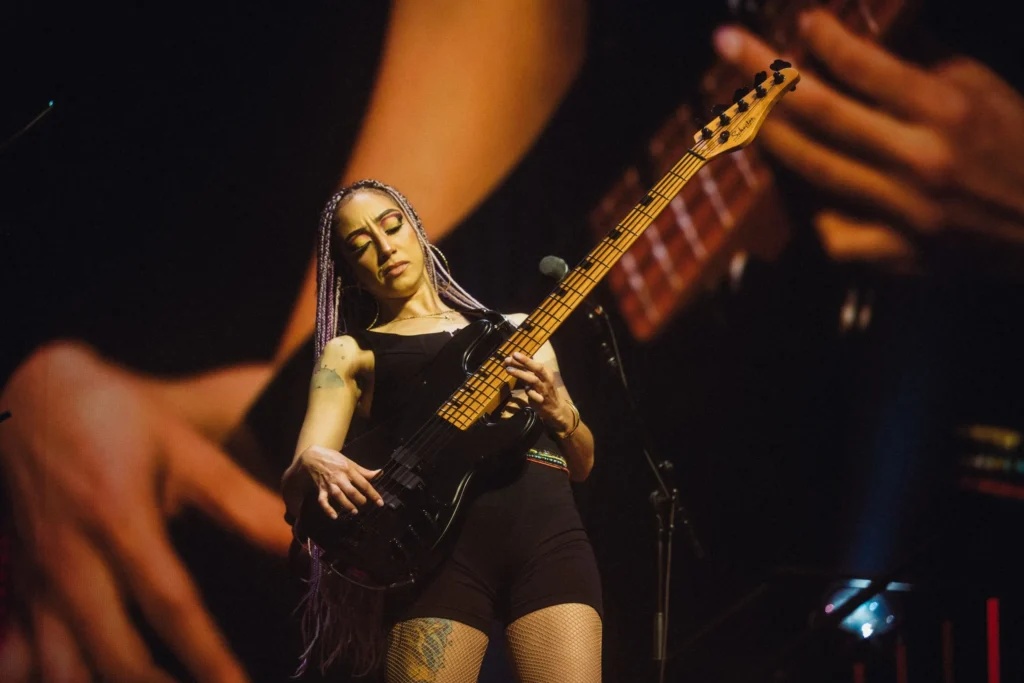
What was it like to land your first big touring break with Nick Jonas in 2015?
It was a completely different experience for me. But in a lot of ways, being in the Marine band trained me for it: chain of command, tiers of management, showing up in a professional manner, arriving early, making sure that my preparation level was the highest, being comfortable with travel and different housing — it all prepped me for that. As for the performances, they were more rigorous than anything I had done before. The intensity and pressure of being on stages that size, for those crowds, was huge. You didn’t even want to sneeze onstage. When we started playing those arenas, it was a bit of a shock, but I tend not to look out to the audience as much as I probably should. I’m just focused on being in the music. One second of your brain wandering and you could make a massive mistake. It was all so surreal, though.
How did you land the Lizzo gig in 2020?
I met a musician named Q, who was our musical director. We met at a jam session when I was new to L.A. and we exchanged numbers, which happens all the time. Years went by, and he hit me up and asked if I wanted to play the Grammys with Lizzo, and I was like, what? The next thing I knew, I was on the road with her. At that point I was a little more used to that level of work and playing on those stages, so it was familiar, but every experience is so different. Everybody on the team was comfortable to work with, and it felt a lot less anal than other situations. Getting to see how Lizzo works is amazing. She’s professional, efficient, she cares — she always said hello and goodbye, she knew everyone in the room, and she would encourage us. It felt like a really respectful and exciting environment. You don’t ever get complacent or too comfortable playing arenas and for huge audiences, because every night and every crowd is different.
It seems like becoming comfortable with the uncomfortable is a key to your success.
I used to try to go after situations that were specifically uncomfortable just to be able to make myself be able to adapt to them, whether it was musically, physically in working out, or even extreme travel situations. Now I just know those situations are going to come and I’m going to be ready for them and be able to relax into the moment. Any time the flow of energy gets stifled, we start clenching up and getting tight. Those are opportunities to take a breath and get in my body and focus on what I’m doing. It’s important to recognize it and acknowledge it.
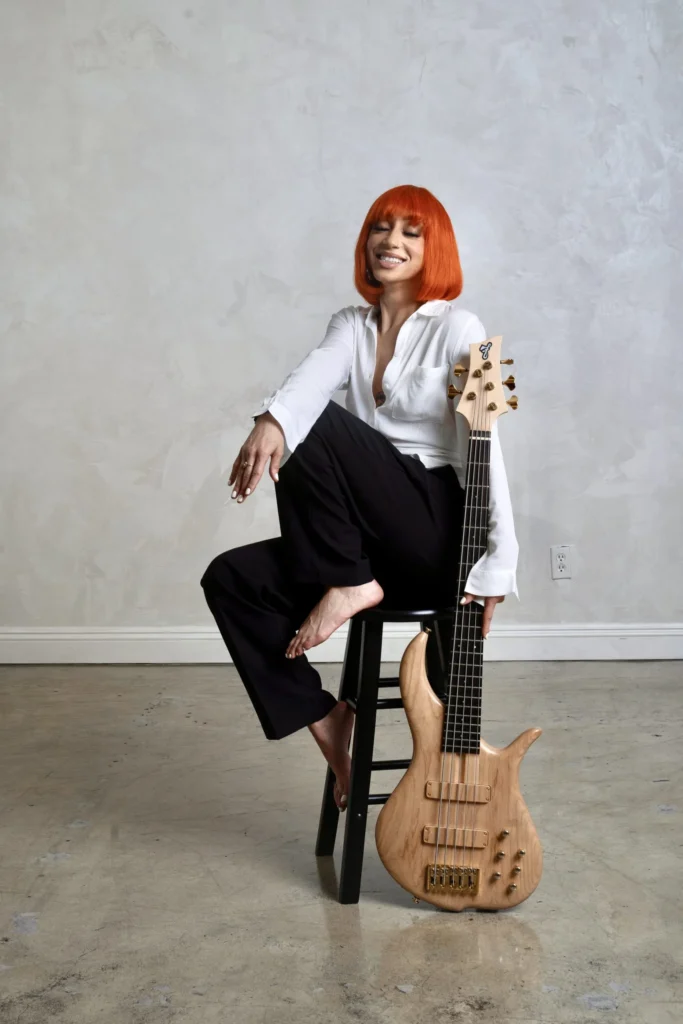
I have a great level of care for the music. I’m the person who always wants to run things another time and put the work into it. I don’t just show up and do my part and leave. I give each project all of myself.
What are the factors that led you to land all of these huge gigs?
I have to be honest — my initial thought is that a lot of times, artists are looking for all-women ensembles. To be fair, there are a lot more great women musicians on the scene now than there were before. If musical directors find ones who are good, then they’ll continue to use them. I like to think that I can play solidly enough to play in almost any situation, but I do find myself in bands with all women, which I think is a very L.A. thing. I definitely have a detailed awareness to learning, and people know that I have a great level of care for the music. I’m the person who always wants to run things another time and put the work into it. I don’t just show up and do my part and leave. I give each project all of myself.
What are your feelings about getting recruited for all-women bands?
I had some of the same programming that a lot of people have, which is that women aren’t as good at playing as men, which obviously has been perpetuated over time. Because of that, I wasn’t really excited to get called in for these all-women bands. It felt a little boxed-in; it didn’t make me feel like part of the entire music community. I was instead part of this specific community. Like, you girls can go play over there and we’re going to play the real music music. It was a double-edged sword, because it was awesome to be in those limelights and get that experience and get to work with those artists, but it did feel like typecasting. At the same time, I learned about so many women musicians who I wouldn’t have known about. I’m grateful for every opportunity I’ve ever gotten, and they all have made me the player that I’m growing to be now. To sum it up, it wasn’t my desire, but I actually learned so much from it and I’m happy to see that women are able to accept women in music because it isn’t about gender, it’s about the music.
When you’re recruited to play with an artist, what is your process for learning the material?
It depends on the turnaround time. If I don’t have time to sit and do a lot of listen-throughs, then I’m going to jump right into charting it out, which takes a good hour per song. That helps me retain it. I try to notate specific notes and rests that stand out, and I need to know the rhythm immediately. In that process I get the songs down, and then I give myself four-hour chunks of time and it’s like a job. I give myself 15-minute breaks after each song to clear my head, and then I hit it again to get it done. I chart it out, and then I make a short reference version that’s a cheat sheet of the keys and time signatures, and then I listen to the songs at different volumes and on different speakers so that my ear picks up different pockets of the groove and little details that happen. Then I get an earworm where the song is constantly playing in my head. Then I jam on each song for about an hour until it starts feeling natural. If I have time, I’ll have fun and solo over it or learn the harmonies.
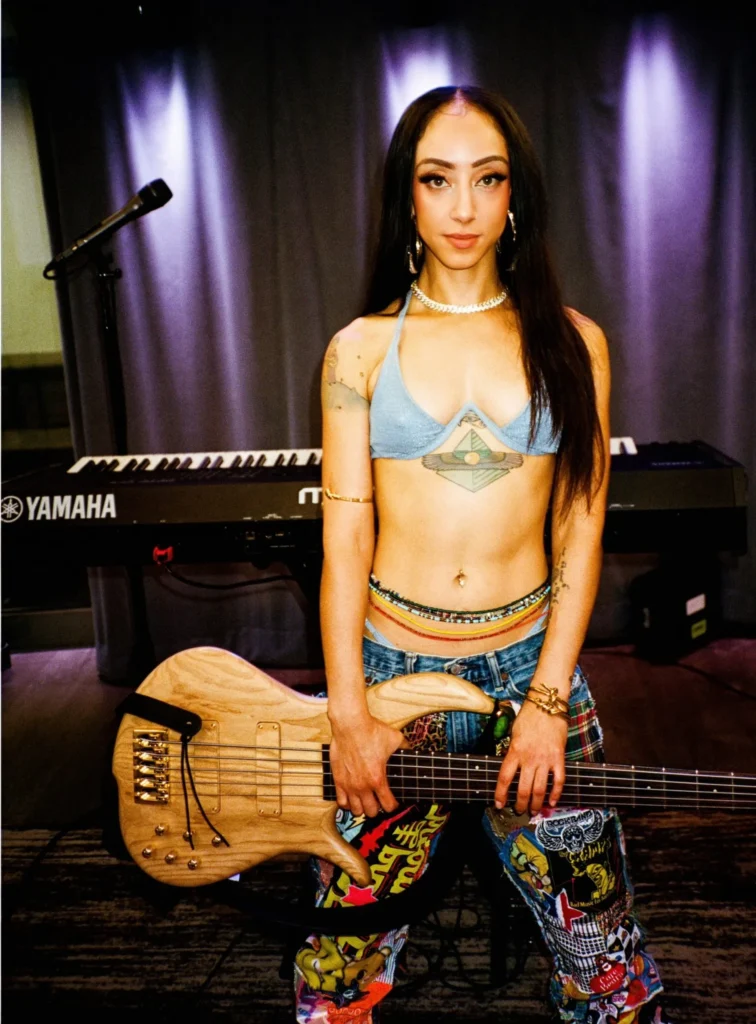
You play a gorgeous F Bass 5-string. What do you love about that instrument?
I got the F Bass about a year ago. It can take a while to get familiar with a bass, and it took me a minute to figure out all the tone options with all of the knobs on it. The sound profile is massive, and I’m still learning how to perfect it. That bass just sings and talks back. It gives me something to respond to. I call her Nala and I’ve fallen in love with her.
How would you describe your playing technique?
When I first started, I played like James Jamerson — I couldn’t get both fingers going, so I’d only use one. I eventually learned that technique really matters. My dad put me on to the thumb-and-first-finger [plucking-hand] technique. It gives you the palm-mute ability and you can have room to feel the notes moving. It helps me to keep each note consistent that way. Obviously, I use a traditional two-finger style a lot, but the fingers aren’t the same length, so I focus on continuity when I use that. Coming from the era I did, a lot of people want key-bass sounds, and I am not proficient on key-bass, so I play up on the neck really softly to get those tones. In general, I play softly on the bass. Some things require you to dig in with more intensity, but it’s usually a lot less than you think. I’m not so much a Jaco bridge-position player; I like playing more forward to get more give of the string. I really love palm muting, and sometimes I’ll pluck to get some punch into the lines. When I’m playing, I’m not thinking about my hands, I’m usually thinking about what sound I’m needing in the moment.
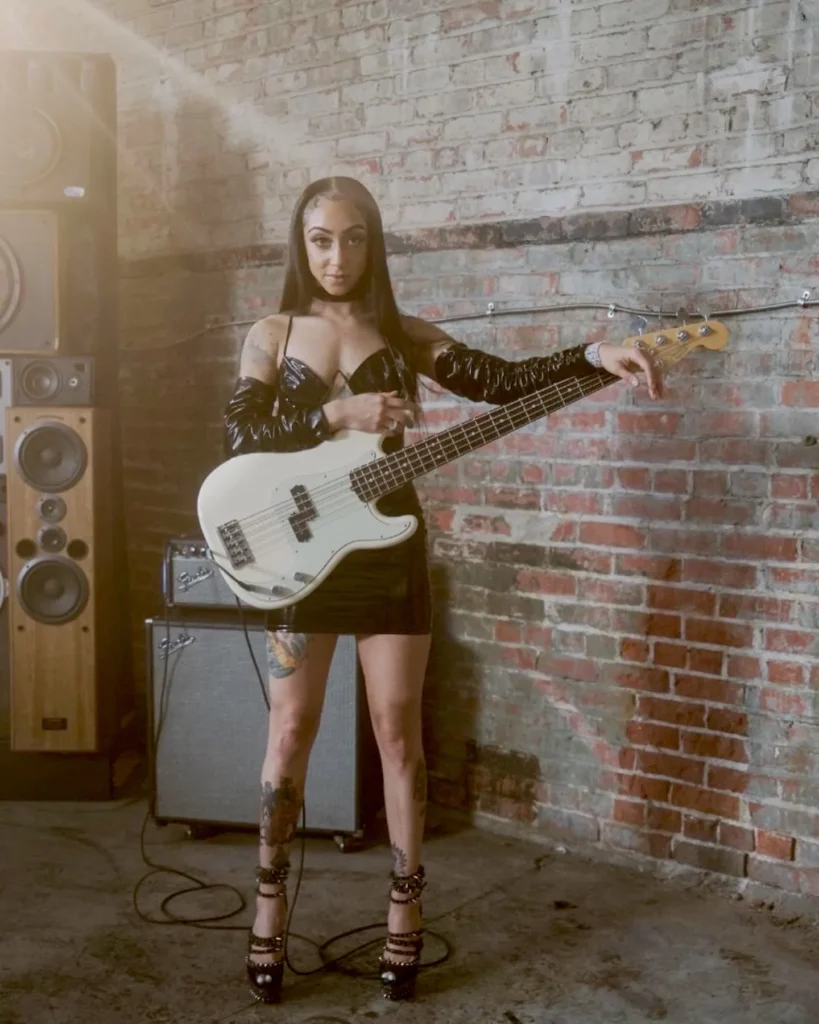
What is your ideal bass tone, and how do you achieve it?
I love a very thick, singable tone. Derrick Hodge is a representation of that for me; he has a clean, articulate tone that comes from his hands. He allows a lot of warmth but makes it sing. Maybe his hands are just that warm naturally. That’s the tone that I love, and that’s what I go to for myself. Bass should be a big old cloud of comfort and support from the bottom.
Who are your greatest bass influences?
I started out listening to a lot of funk, so I was big into Bootsy Collins and Parliament–Funkadelic. I love the groove master Verdine White, and I’m obsessed with Earth, Wind & Fire. He uses the entire fretboard of the bass without soloing, and that showed me I could stay in the groove and work up the neck when I want to. Willie Weeks is huge for me. My dad put me on to him, and I was in tears listening to his solo on Donny Hathaway’s “Everything Is Everything” [from Donny Hathaway Live, 1972]. I couldn’t believe he made four notes sound so vast . You have to have so much comfort and command of the role of your space to do that. As I got older I got into Dwayne “DW” Wright, who is huge in the gospel scene. His fluidity and sing-ability and cleanliness with his notes just blows me away. When I was in the school of music in the military, I was digging in the vault and I found John Patitucci, Victor Wooten, and Steve Bailey and got obsessed with them. They all helped me learn what the bass can do and what’s available. Like I said, Derrick Hodge is my forever favorite. I was also hip to Thundercat early on, and I love following him. So many players have helped shape me.
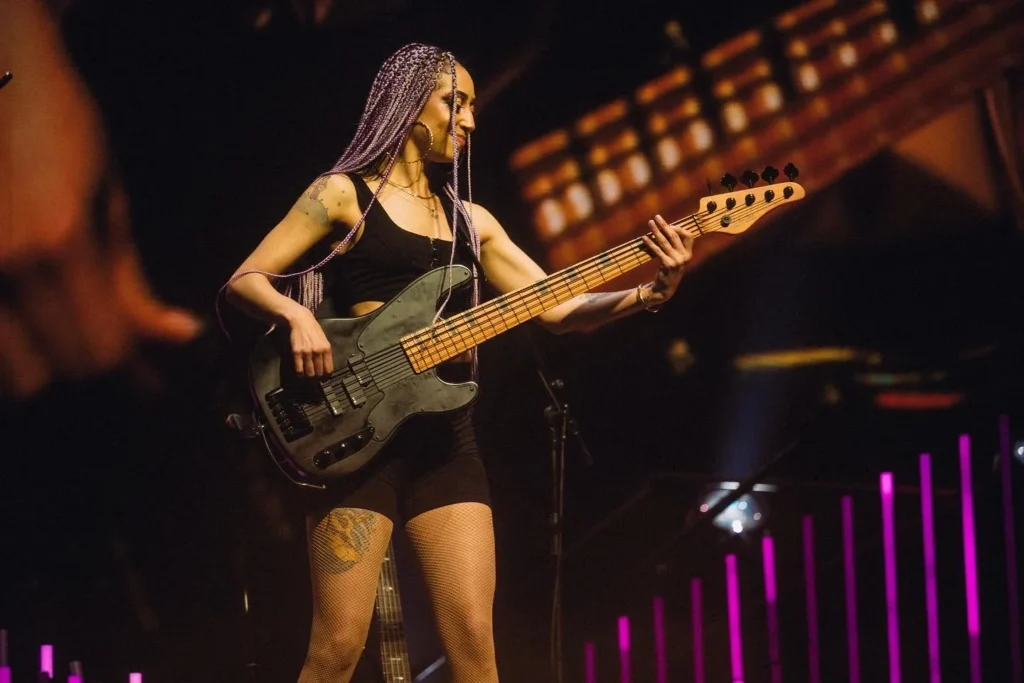
I love to have room to play, but also have something consistent to lean back on in my playing. Too much freedom can be paralyzing for anybody. I love that most bass lines are repetitive, so it gives you something to fall back on, but there’s room to explore in that framework.
What’s the best advice you’ve ever been given about bass?
My high school bass teacher Rick Strauss once told me that “slow practice is fast learning.” Also, I met Chuck Rainey at Victor Wooten’s bass camp, and he told me that if you want to be a better player, be a better person. That’s always stuck with me. I really find that to be true.
Why bass? How does the instrument resonate with your personality?
I’m not a person who prefers the limelight. Even the placement of the amp onstage, needing to be in back behind the band, shows the role of bass. I also love to observe and see what’s going on so that I know how to support it, so being in the back suits that personality trait. I love to have room to play, but also have something consistent to lean back on in my playing. Too much freedom can be paralyzing for anybody. I love that most bass lines are repetitive, so it gives you something to fall back on, but there’s room to explore in that framework. And bass is a supportive role and I like to bring comfort to people and make people feel safe, so I try to provide that in my playing. Just like a nice comfy couch.
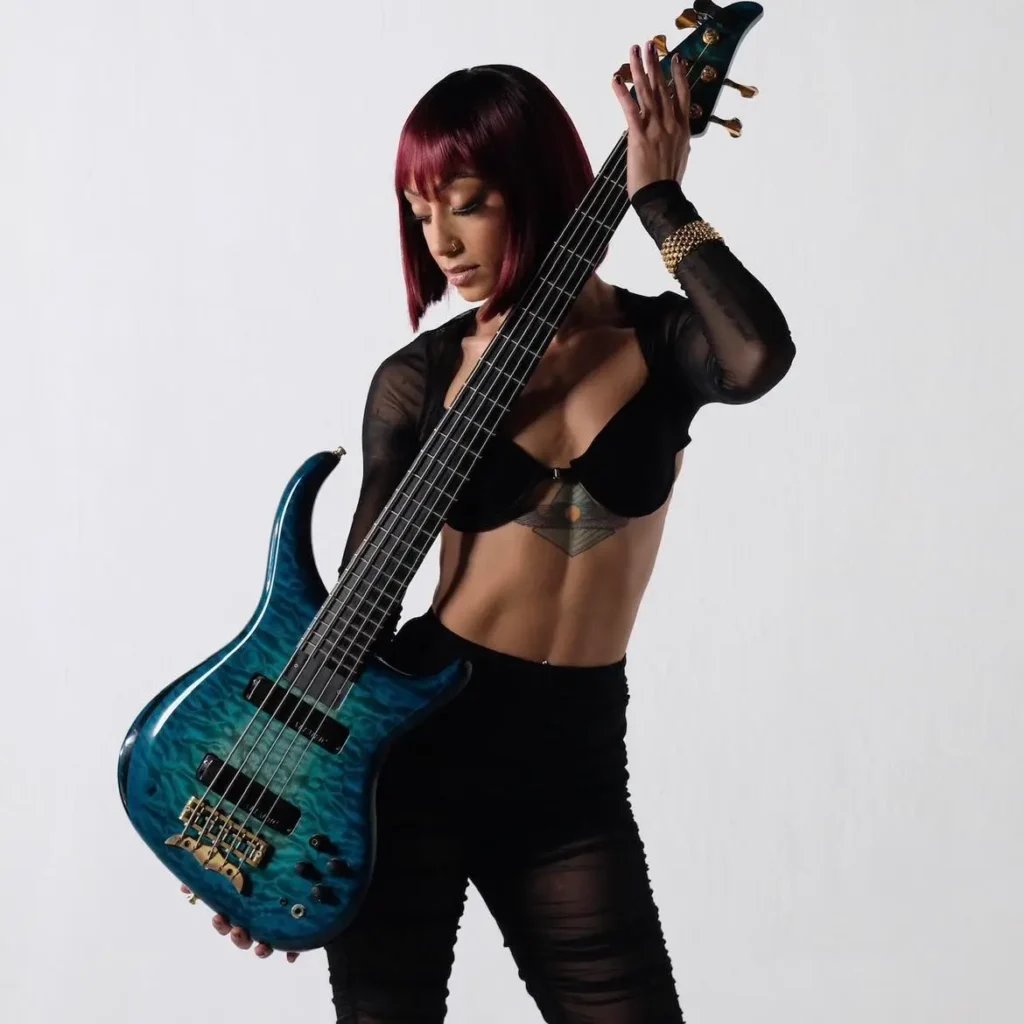
Gear
Bass F Bass BN5, Moollon J-Classic, Schecter basses
Rig Gallien-Krueger Neo cabs, EICH Bass Board subwoofer
Effects Moollon Bass Q Envelope Filter, Earthquake Devices Low Signal Shredder, MXR Bass Chorus, Electro Harmonix Micro Bass Synth
Strings DR Strings Black Beauty
Check out the entire issue at: https://bassmagazine.com/issues/issue-15/zuri-appleby-sergeant-of-low-end/

